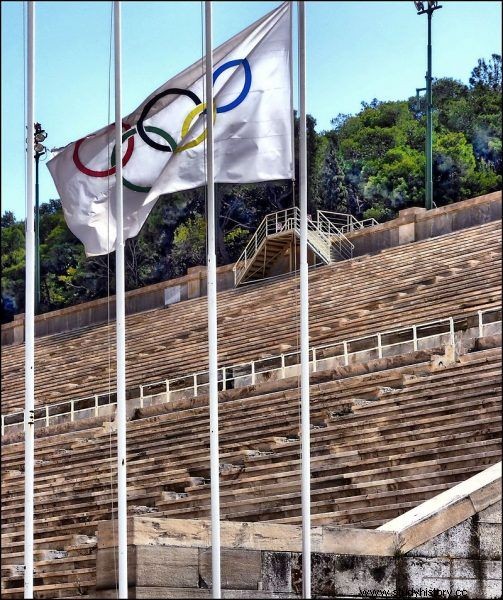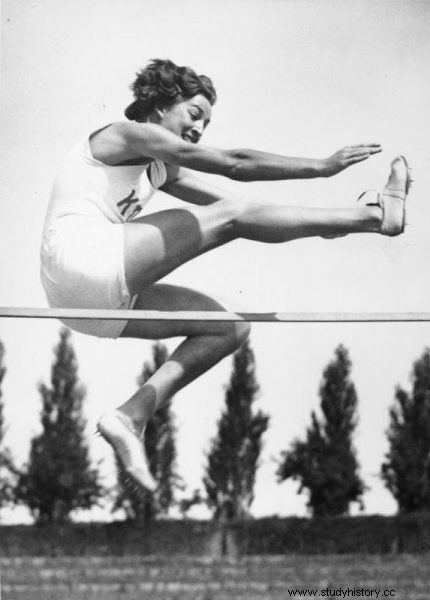Malnourished and weakened they jumped with a penalty frog, played volleyball and ran for the "hundred". Sports struggles were to give them, at least a substitute for normality. Who? Prisoners of POW camps who, in 1940 and 1944, organized their - as they proudly called them - games behind barbed wire.
On August 16, 1936, the Games of the XI Olympiad ended in Berlin. The Polish team won three silver and three bronze medals. Gold turned out to be out of reach. Four years later, the Poles won the general classification - only these games were played behind the camp wires.
In 1940, both the Summer and Winter Olympics were to be held in Japan. Respectively:in Tokyo and Sapporo. In the summer of 1938, the IOC decided to change the organizing cities, as the Japanese, caught in the war with China, were unable to organize the events. Thus, the summer games were moved to Helsinki and the winter games to Garmisch-Partenkirchen in Bavaria.
However, on September 1, 1939, World War II began and many athletes wore military uniforms instead of tracksuits. According to historian Ryszard Wryk, as many as 124 Polish Olympians fought in the September campaign:12 were killed and 42 were sent to German or Soviet POW camps . When the Soviet-Finnish conflict began in November 1939, it became clear that the next Olympic Games would not be played. Sports rivalry has given way to the one at the front.
Conspiracy and ingenuity
Stalag XIII Langwaseer near Nuremberg. Platoon leader Jerzy Słomczyński - physical education instructor of the 82nd Infantry Regiment in Brest and a pre-war football player - is one of the prisoners of the POW camp (for privates and non-commissioned officers). At the end of August 1940, he came up with the idea of organizing an underground sports competition to replace the canceled Helsinki Olympics. This idea met with general acceptance of fellow prisoners.
"Straw", as the originator was called, gathers around him an international group of people, including:Yugoslav, British, Belgian, Norwegian, French and Dutch. They formed an organizing committee for the "Camp Olympics" . It was headed by British officer O'Brien, and Roger Virion, a former tennis player and now a paramedic, was responsible for the smooth running of the competition.
For a long time, the prisoners discussed the competitions that should be included in the program of the struggle. In the selection process, the main role was played by the possibility of quickly disguising them, in case the Germans discovered that, without their knowledge, a sports event lasting several days was taking place in a prisoner-of-war camp. So the committee decided that the Olympians would compete in volleyball, cycling, shot put, archery, long jump and 50 meters ... with a penalty frog.

The role of the Olympic flag was played by a shirt decorated with five circles.
The opening of the Games took place on August 31, 1940. The prisoners gathered in the solitary confinement of the Lazaret, the entrance of which was decorated with an inscription warning against typhus. The athletes prepared everything with the greatest care: the Olympic torch was the remains of burning fat in canned food, the flag - a shirt decorated with five circles . Wacław Gąsiorowski - a hairdresser from Łowicz - wrote the anthem, and Jan Cioch took the oath on behalf of the participants. This is how Teodor Niewiadomski remembers that moment in the book "Olimpiada, which never happened ...":
Cioch approached the presidential table. His right hand was in the air ... it was trembling visibly, his fingers were trembling [...].
- What about our Johnny?
Damp eyes, nervous spasms. The clenched mouth was speechless. Finally…
- On behalf of all the athletes whose stadiums are fenced with barbed wire ...
The struggle has begun. The first competition was volleyball. While the Germans were eating dinner, in the hospital square, among the trees on which laundry was hung, the Dutch faced the Belgians. The latter were already leading 7:1, when suddenly the camp doctor appeared in the hospital door. Shocked by the sight he found, he reported everything to the management. Caught "red-handed" the players ended up in the penal company, but the competition continued.
The next competitions were very smooth. The organizers created special guards to warn of the approaching Germans. The last chord of the Olympics was a 50-meter run with a penalty frog, which was played ... openly. The Germans believed that the prisoners practiced the punishments given to them. The aforementioned Teodor Niewiadomski was the winner of this competition, and his victory gave the Poles the lead in the medal standings. The first games behind the wires were closed on September 8, 1940.
With permission and with results
Four years later, the Games were to be played in London (summer) and Cortina d'Ampenzzo (winter). Unfortunately, the war was still going on and the IOC canceled both events. At the turn of July and August 1944, prisoners from the POW camp in Woldenberg (Dobiegniewo) in Western Pomerania took matters into their own hands. This is where the second games behind the wires took place - slightly different from the previous ones.
The organization was led by Lt. Antoni Grzesik, the one who, during the September campaign, gave orders to Janusz Kusociński, the Olympic champion from 1932. He wasn't acting alone. Together with the Association of Military Sports Clubs he made an official request to the management of Oflag II C Woldenberg, in which he asked for the possibility of organizing the 1944 POW Olympics. The Germans, who realized that their situation on the fronts was bad, and that they could improve their image a bit, agreed. So this time the participants didn't have to hide.

The Berlin Olympics in 1936 turned out to be the last such official event before the long break (in the photo Elfriede Kaun, who jumped high). The prisoners in the German camps, however, organized their own Olympic struggles.
It was agreed that the grand opening would take place on July 23, 1944, and athletes would compete in boxing, basketball, athletics, football, handball and volleyball. However, the German management made a reservation that some competitions could not be held (for fear of jumping the prison walls, even pole vaulting was forbidden). Apart from the program, a chess tournament and an art competition were held.
Despite a few restrictions and the news about the outbreak of the Warsaw Uprising, the Olympics were almost perfect: fans received admission tickets and gathered in large numbers at the competition sites. The players representing six clubs, despite malnutrition and irregular training sessions, presented a very high level . Take, for example, the results of the 100-meter run, the winner of which, 2nd Lt. Speczyk-Widawski, achieved a result of 11.5 seconds - only 1.3 seconds worse than the world record! The best received medals and diplomas embossed in paper. The second Games behind the wires closed on August 13, 1944.
Sports rivalry in the camps has become a symbol of faith in the Olympic idea. She gave the participants hope for a better tomorrow and - necessary in these places - patience. Today it is difficult to say how many prisoners avoided suicide thanks to a punishment frog or volleyball. Even if only one - the games behind the wires were worth it.
